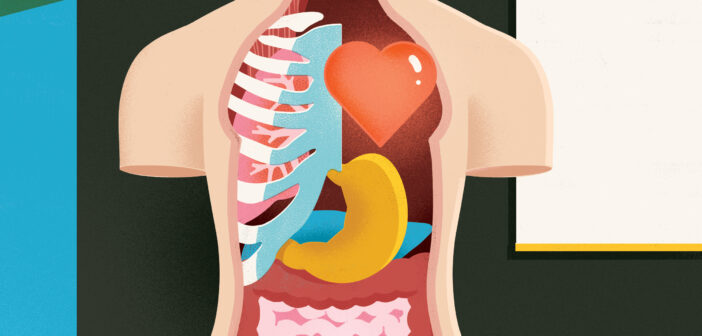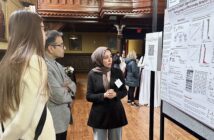Humanism and Compassion
Brown develops doctors who aren’t just skilled at medicine, but who bring a sense of deeper humanity to their role and to their patients.
As a member of the Medical School’s admissions committee, Sigal Family Professor of Humanistic Medicine Fred Schiffman, MD, P’96MD’00, has an unfiltered view of prospective students’ understanding of Brown. “The students who interview for the Medical School have already identified Brown as a place where medical humanism is at the forefront,” he says. “They ask me very sophisticated questions about how this is part of thecurriculum.” This reputation was built with intention by founding dean Stan Aronson, MD, a neuropathologist. “He was an extraordinary listener and servant leader,” Schiffman recalls. “He was a preeminent medical humanist.”
Aronson helped infuse the values of humanism and compassion deep into the Medical School’s genetic code, where they continue to be expressed in myriad ways. Perhaps the textbook example of this value is the Program in Liberal Medical Education, which allows students to pair their medical education with a wide-ranging mix of humanities courses that include politics and poetry, world languages and literature. Such broad coursework doesn’t just make students more well-rounded people and doctors: it broadens their opportunities and helps them see their work within a larger context of health and wellness.
Schiffman adds that the existence of a role like his—a position focused specifically on humanism in medicine and funded in perpetuity—is both distinctive among medical schools and evidence that Brown is deeply committed to these stated values.
As part of his role, Schiffman has developed and overseen numerous programs designed to highlight and encourage humanistic care. This includes Poetry at Morning Report, in which residents read favorite poems as a way to reflect on what it means to care for others. Another program, Cops and Docs at the Rhode Island School of Design Museum, brings together residents and police detectives who use their unique skills to observe closely, to look for clues, and to see stories within art. Participants get to know each other, dispel myths, and see the world with more curiosity and humanity.
Even programs that typically focus on hard data and numbers have been imbued with humanistic values: while honor societies typically recognize the best and brightest based on grades and scores, the national Gold Humanism Honor Society layers in requirements linked to compassion and empathy, seeking out students who show selflessness, care, and strong communication skills.
The Medical School has also added roles and programming to foster a deeper sense of humanism and compassion. In 2021, Kelly Holder, PhD, became the School’s inaugural chief wellness officer. “We know it’s difficult to be altruistic and compassionate unless you have the sustenance and tools to be able to give to others,” Schiffman says. “[Brown] is unique among medical schools because we talk about this out loud.” The Department of Medicine is also working to create a new medical humanities track for its internal medicine training program, which is designed to help residents improve patient-physician relationships and fuel personal growth.
Schiffman says that these values aren’t just shown through programming: they are part of the culture, and can be found across the Medical School’s entire community. Prospective students feel it before they even arrive, and faculty choose Brown because they see how they can contribute in ways that align with these ideas. “We are people with heart,” Schiffman says, “and we want people with heart.”




